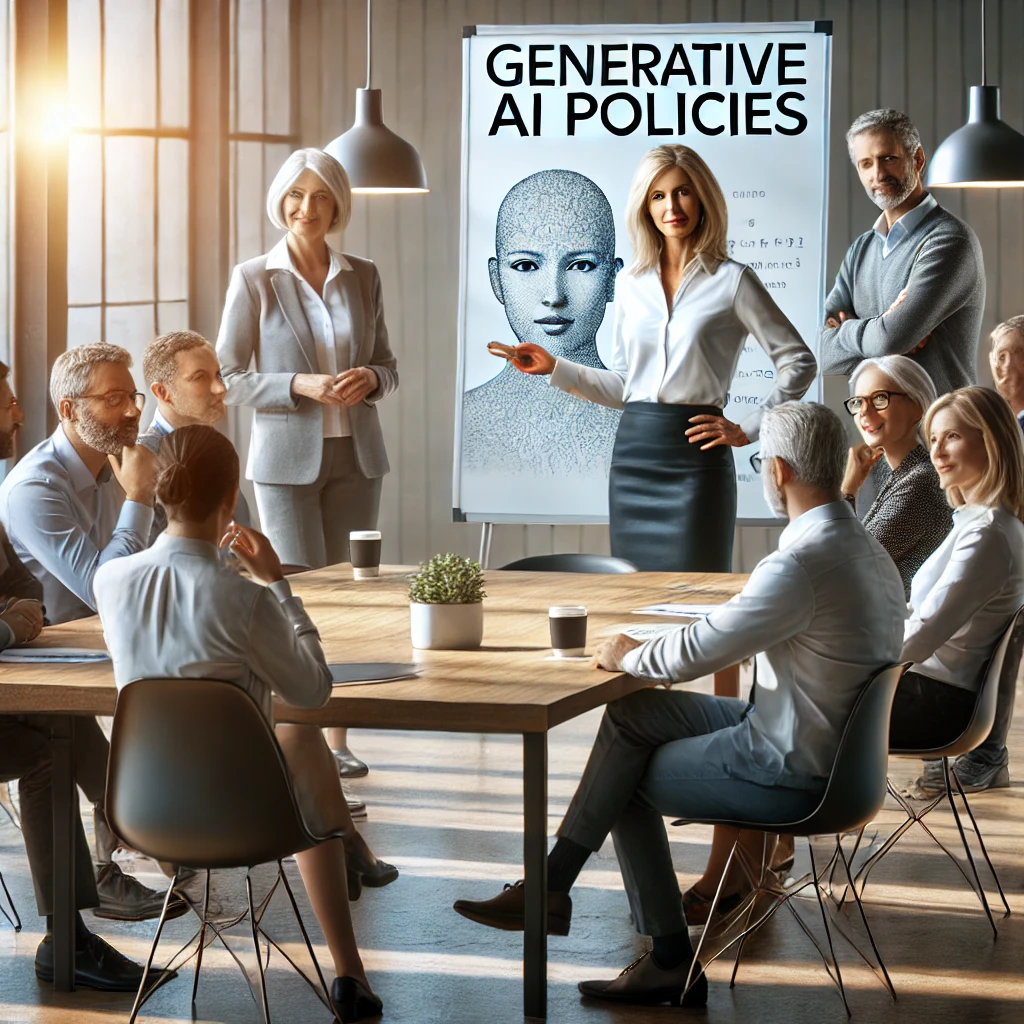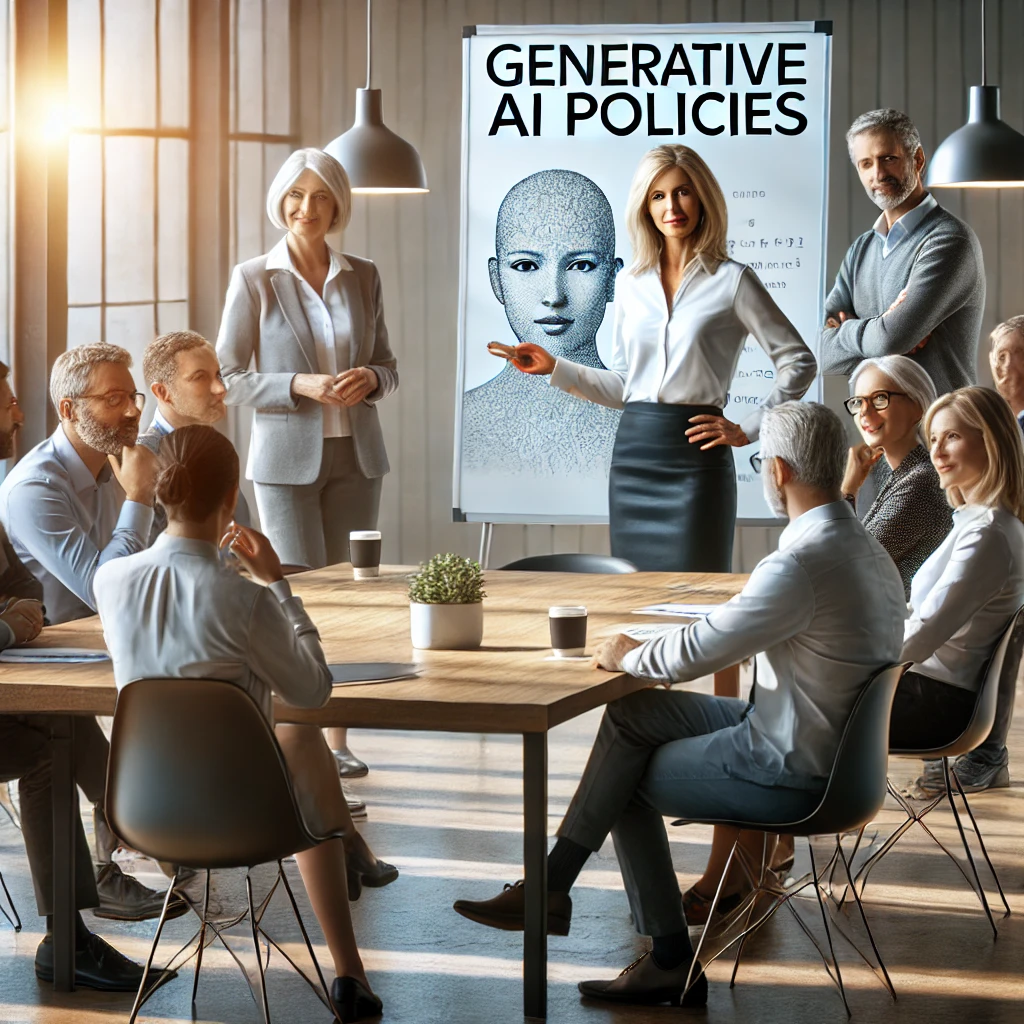
Why AI Policies Matter in Social Housing
AI is transforming social housing, offering efficiencies in tenant management, maintenance, and communication. However, without clear governance policies, housing providers face risks related to data privacy, compliance, and ethical use.
In a recent Deloitte survey of 30,000 employees across 11 countries found that 63% of workers using generative AI said their company encourages (44%) or allows (19%) its use, while 23% reported no AI policy. Meanwhile, the European Centre for Vocational Training found that one in seven European workers use digital tools for task automation, with 22% relying on AI for text-related tasks like recognition, translation, transcription, or generation.
For executives, AI governance ensures strategic implementation while protecting tenants and organisational integrity. For Board Members focuses on compliance, financial responsibility, and risk mitigation. This blog outlines practical AI policies to help social housing providers navigate these challenges and maximise AI’s potential.
1. Setting AI Guidelines for Staff
Employees may already be using AI tools like ChatGPT to draft documents, handle tenant queries, or generate reports. Without clear policies, this could lead to misinformation, privacy breaches, or over-reliance on automation.
Key Considerations:
- Appropriate Use: Define acceptable AI applications, such as drafting communications, while restricting AI involvement in sensitive areas like rent assessments.
- Data Security: Ensure AI tools comply with GDPR and do not process or store sensitive tenant data.
- Human Oversight: AI-generated content should always be reviewed before use.
Resources to Consider:
- The official guidance for how civil servants should use this technology from the UK government
- One-Pager for Staff from London’s Office of Technology
- A sample policy from the Society for Innovation, Technology and Modernisation
- AI Policy Template from the Responsible AI Institute
2. AI Procurement: Choosing the Right Tools
AI procurement must align with social housing needs, ensuring solutions are ethical, fair, and cost-effective.
Key Considerations:
- Bias & Fairness: AI models must not reinforce discrimination or disadvantage vulnerable tenants.
- Compliance & Ethics: AI vendors must demonstrate adherence to UK data protection laws and ethical AI principles.
- Cost vs. Value: AI should enhance services without unnecessary financial burden.
The World Economic Forum’s AI procurement guidelines offer insights on responsible AI adoption
3. Transparency: Communicating AI Use to Tenants
AI is increasingly used for rent reminders, maintenance requests, and tenant queries. Transparency about AI’s role builds trust and accountability.
Key Considerations:
- Clarity: Explain how AI is used in tenant services.
- Human Accountability: Ensure tenants know that final decisions remain human-led.
- Data Protection: Reassure tenants that personal data remains secure.
See how The Guardian and BBC maintain transparency with AI policies
Recent research from the Centre for Data Ethics and Innovation found that most people are okay with using AI in the public sector for simple tasks, as long as a human checks the results and takes responsibility.
4. AI in Digital Tenant Services
AI enhances digital services by improving response times and predicting maintenance needs. However, fairness and accessibility must be prioritised.
Key Considerations:
- Accessibility: AI tools should cater to non-English speakers and tenants with disabilities.
- Fair Outcomes: AI must not unintentionally disadvantage certain tenant groups.
- Security & Reliability: AI-generated responses must be accurate and continuously monitored.
The European Centre for Vocational Training highlights AI’s impact on workforce skills and tenant services.
Matrix for Selecting Responsible AI Frameworks, This report provides a structured matrix to help organisations navigate the complexity of implementing responsible AI. It categorises 40 public AI frameworks by focus area and intended users, making selecting the most relevant resources for ethical AI adoption easier.
5. AI in Housing Applications & Submissions
More tenants are using AI to assist with housing applications, appeals, and complaints. Providers must ensure AI-generated submissions are accurate and fair.
Key Considerations:
- AI Disclosure: Require applicants to disclose AI use in submissions.
- Verification Processes: Human oversight should review AI-assisted applications to prevent errors or bias.
- Safeguarding Integrity: Ensure AI does not create unfair advantages.
6. Implementing AI Governance in Social Housing
A robust AI governance framework ensures housing providers adapt to new technology while maintaining accountability.
Best Practices:
- Regular AI policy updates to reflect new technologies and regulations.
- Staff training on ethical AI use and risk mitigation.
- Clear accountability structures for AI-powered decision-making.
- Tenant engagement initiatives to ensure transparency and fairness.
Additional Insights on Generative AI Governance
Harvard Law School researches AI governance in corporate organisations.
Microsoft provides AI governance tools for compliance and ethical use.
Credo.ai offers a platform for tracking AI policy compliance.
Conclusion: Taking Action on AI Policies
AI is here to stay, and social housing providers must adopt clear, practical policies to balance innovation with tenant protection. Executives need AI governance to drive efficiency and improve services. Board Members must ensure policies align with legal, financial, and ethical standards.
Key Next Steps:
- Review existing policies and update them for AI integration.
- Set procurement standards for AI tools in housing services.
- Enhance transparency so tenants understand AI’s role.
- Create an AI ethics board to oversee responsible AI use.
By taking a structured approach, housing providers can leverage AI’s benefits while ensuring fairness, compliance, and trust.
For a copy of the AI Policy Template” by the Responsible AI Institute click here.





